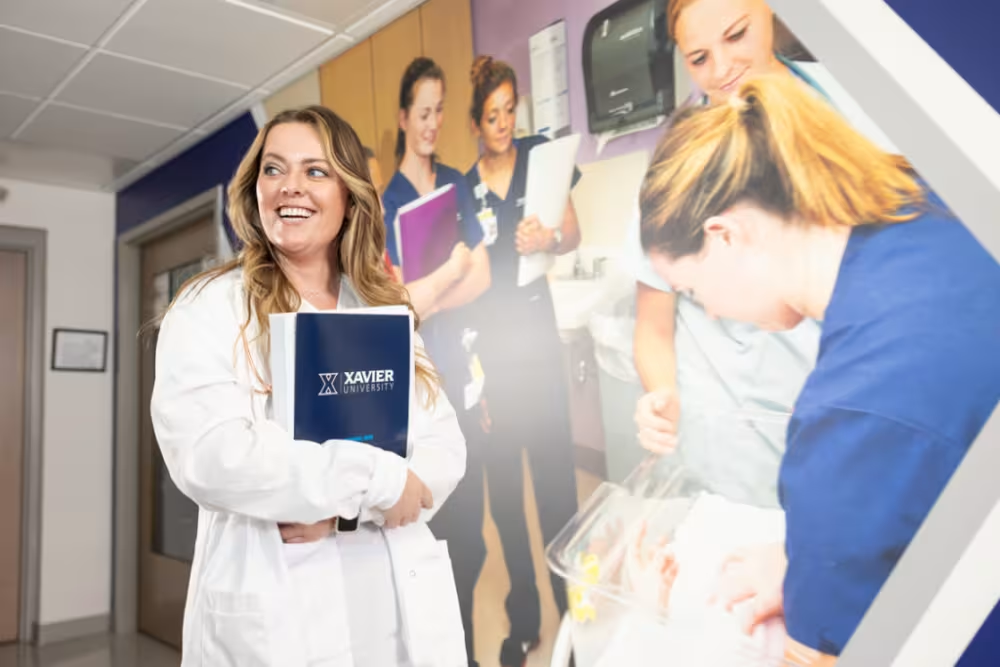How to Get Into Nursing School: A Step-by-Step Guide
Each blog post is dated and contains accurate information as of that date. Certain information may have changed since the blog post publication date. If you would like to confirm the current accuracy of blog information, please visit our ABSN program overview page or contact us at 866-890-9467.
If you’re wondering how to get into nursing school, you’ll first need to find the right program to meet your needs, even if it might mean relocating. Then, you must complete the necessary prerequisites. Finally, you’ll assemble your application package, including letters of recommendation and a letter of intent.

It’s a great time to consider switching to a career in nursing. According to the U.S. Bureau of Labor Statistics (BLS), employment for registered nurses (RNs) is expected to grow 6% from 2023 through 2033, faster than the national average for all professions. With nursing opportunities flourishing, now is a great time to enroll in nursing school.
If you already have a non-nursing bachelor’s degree, there is a more efficient path to a nursing degree than a four-year program. An Accelerated Bachelor of Science in Nursing (ABSN) program, such as the one at Xavier University, can allow you to graduate with your nursing degree in as few as 16 months. If you have college credit, but didn’t complete a degree there is also a pathway for you into the ABSN program at Xavier. Xavier is invested in every student’s success, so we have Academic Success Coaches on staff to help support your progress. Before you start thinking of graduation, however, you should know how to get into an RN program.
That answer will differ from one program to the next. At Xavier, our friendly admissions advisers are here to streamline the process. First, you’ll need to review the admission requirements.
Understanding the Requirements to Get Into Nursing School
Every nursing program has a unique set of admission requirements. At Xavier, for example, you may have a completed bachelor’s degree in a non-nursing subject to enroll in the ABSN program. A degree must be from an accredited institution and a cumulative GPA of 2.7 or higher is required for admission into the ABSN program.
There are four prerequisite requirements that are required for students who already have a degree and they must have been taken within the last eight years. Your admissions adviser will review your unofficial transcripts to determine which prerequisite courses you may need to take.
Each of the following prerequisites must be completed within eight years before your ABSN start date, and you must earn a grade of at least C in each course. You may retake a course, if necessary, but only once. You must have a minimum GPA of 3.0 or higher for all prerequisite courses to be a viable candidate for the ABSN program.
Xavier’s prerequisites are:
- Microbiology
- Human Anatomy or Anatomy & Physiology I + Lab
- Human Physiology or Anatomy & Physiology II + Lab
- Statistics
When you’re ready to start your ABSN prerequisites, you can conveniently complete them online through our university.

How to Get Into a Nursing Program: The Application Process
The next step toward becoming a nurse is applying for nursing schools. Xavier’s ABSN program reviews applications on a rolling admission basis. That means you can apply year-round. Start dates each year are in January, May and August.
You’ll need the following items to apply:
Letter of Intent
While your transcripts show us your academic qualifications, your letter of intent or essay tells us what kind of person you are. It’s one of the best ways to stand out with our admissions committee. We want to know why you want to become a nurse and how you plan to get through nursing school.
When writing your essay, consider the following:
- Be memorable when you describe what inspired you to become a nurse.
- Be passionate when explaining your commitment to the profession.
- Be transparent and write from the heart when describing your motivation.
- Be direct by using clear, concise language.
Current Resume
If you have healthcare experience, emphasize it in your resume; however, prior healthcare experience is not necessary to apply to our ABSN program. Any prior working experience will likely have transferable skills to assist you in your nursing career. Highlight relevant qualities, such as confidence, compassion and commitment.
Recommendation Letters
Request your letters of recommendation as soon as possible to leave enough time for your academic and professional references to craft a thorough letter. Additionally, be courteous when requesting a recommendation letter; they’re doing you a favor. Note that you cannot use letters of recommendation from family members.

How to Increase Your Chances of Getting Into an RN Program
While you must meet the basic eligibility requirements for our ABSN program, we take a holistic approach to reviewing nursing school applications. We realize that being a successful nurse requires more than good grades and a high GPA; dedication and selflessness are also vital to career success.
Nursing school requires hard work and focus, so we want to see that you have the time, energy and resources to commit to full-time nursing study.
As we review applications, we’re looking for highly determined individuals who are problem solvers, critical thinkers and receptive learners. These skills will help you identify issues, develop solutions, set priorities, make decisions and internalize new information in your nursing practice. We’re also looking for authentic applicants who know why they want to become nurses.

Learn more about nursing school requirements to enroll in a nursing program.
How to Start Nursing School Once Accepted
You’ll need to do several things once you’re accepted to nursing school. First, if you’re relocating to one of our two locations in Ohio, you’ll need to make plans to move. You may also need to do the following:
- Make childcare arrangements if you’re a parent
- Apply for financial aid to cover tuition
- Take out loans or use savings to cover living expenses
- Resign from your current job once nursing school starts
- Purchase school supplies and basic nursing supplies
- Receive any required vaccinations
- Get certified in cardiopulmonary resuscitation (CPR) and basic life support (BLS)
It can also be helpful to learn more about what you can expect once you start nursing school. You’ll have an orientation day at Xavier, where you’ll meet the other students in your cohort, receive your student identification badge and go over program basics. Start building friendly relationships with other members of your nursing cohort on day one, as you may want to form study groups with some of them.
The nursing school curriculum will be intense. You’ll work through the following learning components:
- Online coursework: The online coursework teaches nursing theories and concepts.
- Nursing labs: The in-person nursing skills and simulation labs teach you how to perform core nursing skills (e.g., IV placement) and develop clinical judgment.
- Clinical Rotations: During clinicals, you’ll be placed at nearby healthcare facilities to gain hands-on experience delivering patient care.
Discover what you can expect in your first semester of nursing school as an ABSN student.

Ready to Work Toward Your New Career?
The ABSN at Xavier University is a program with a purpose. Our mission is to graduate nurse leaders prepared to improve and safeguard the healthcare needs of individuals, families and entire communities. Once you graduate from the ABSN program, you will be fully prepared to take the NCLEX and begin your career as a registered nurse.
Contact an admissions adviser at Xavier today to determine if our ABSN program meets your needs. With rolling admissions and three start dates per year, Xavier offers flexibility and convenience.
